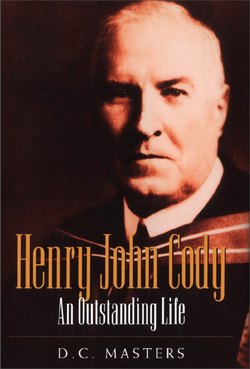Читать книгу Henry John Cody - Donald Campbell Masters - Страница 8
На сайте Литреса книга снята с продажи.
ОглавлениеIntroduction
A biographer of H.J. Cody has special difficulties. If one is writing about a person already well known and celebrated, like Julius Caesar or Napoleon, one writes for readers who have an initial interest in the subject. Cody was a great man in his day, in Toronto especially, in the Anglican Church, in educational circles (both in school and university), and in the Conservative Party, but now, some forty years after his death, he is almost forgotten and indeed unheard of by anyone under 50.
There are several reasons for this. Cody was essentially an exponent of ideas – religious, political, educational – but he wrote no books. He left a large number of sermon notes, manuscripts of speeches, and presidential reports. But these are not readily accessible, and even if they were, they would not be widely read.
Cody left a larger body of “Cody Papers” (chiefly in the Ontario Archives and the Archives of the University of Toronto). As in the case with most private papers, the voluminous correspondence in the “Papers” consists mainly of letters to Cody. There are comparatively few letters by Cody (the author was assured by a university archivist, “Dr. Cody did not write many letters, he preferred to use the telephone”), but there are a few very significant ones, such as a letter to his friend Tommy Des Barres, written after the death of Cody’s first wife, describing the continuing influence of the Christian faith in his life. A higher proportion of the letters are from Cody in the correspondence from the years after he became president of the University of Toronto than in that from his early life and his long rectorship at St. Paul’s. Cody’s diary, which he kept for most of his life, conveys more about his thoughts. The entries are terse, but often revealing, particularly when dealing with some slight or injustice.
Cody’s writings (sermon notes, speeches, presidential reports) give us a fair and full knowledge of Cody’s opinions on the great issues of his life. But to see what kind of man he was, we must depend largely on the reactions of other people, the people who wrote letters to him or who wrote letters about him after his death. Some of these are negative. One of his parishioners thought he was always seeking preferment in the Church (a curious idea about a man who refused the offer of several bishoprics, an archbishopric, and the principalship of two theological colleges). Political opponents resented what they regarded as his adroitness. On the whole, however, the Cody Papers enable us to build up the picture of a very humane person, highly regarded by the parishioners of St. Paul’s and by the many other men and women with whom he came in contact. He was a kindly man who had a genuine liking for people and a remarkable memory for names. Bishop Barfoot, a western Anglican bishop, recalled an incident when he was a young man: “The memory I cherish most was an occasion in St. James Church, Saskatoon, when he spoke to me as he moved in procession down the aisle. ‘It’s Barfoot, surely,’ he said. I, an unknown and at that time very ill young man, was greatly healed and helped by that friendly notice.”
Cody’s means of communicating his ideas was essentially through the oral rather than the written word. His sermons, his speeches across the country, his convocation addresses came to life when communicated through the force and magnetism of his personality. No one who heard him speak in public could forget the vigour and enthusiasm of his delivery.
In a sense Cody had two careers, the first in religion, the second in education. After becoming curate at St. Paul’s Church in 1893, he gradually took over the work of the parish under an aging rector and himself became rector in 1907, a position he held until 1932. He built up St. Paul’s to be one of the largest and most vital Anglican churches in Canada. During the same period he became a sort of ecclesiastical statesman in the Anglican Church and a dynamic lecturer at Wycliffe College. At the age of 64 Cody resigned from St. Paul’s and became president of the University of Toronto. He proved to be an able and courageous administrator who piloted the university through the later stages of the Great Depression and through World War II. He was a key figure in the famous Underhill case (Frank Underhill was a professor threatened with dismissal because of his wartime speeches).
While Cody appears to have had two careers, his life was less of a dichotomy than might be supposed. Cody did not see any real break in his career as a churchman and a university president. He stood for the values of a Christian society, with each person responsible for the gifts that God has given him or her. He had derived this ethic from the Christian community in rural Ontario out of which he came. It inspired his thinking just as surely when he was the minister of education for Ontario as when he was the president of a great university or when he was an active minister of the Anglican Church. Cody was an important man of his time. The events in which he took part had a formative influence on Canadian life, an influence still felt today. This man’s life and his ideals are eminently worthy of our consideration.
